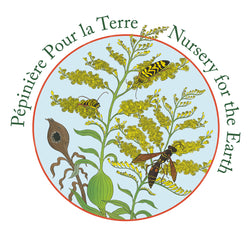When we garden, we are not simply planting plants that sit in splendid isolation separate from the environment. We are also planting every and each relationship that that plant has evolved to support over the past thousands to millions of years.
Planting exotic plants not only comes with the risk of it escaping the garden and becoming an invasive species, but also in supporting invasive insects and other invertebrates as well as potential fungi and pathogens. For example, the dreaded Spotted Lanturn Fly (Lycorma delicatula) has now established itself in the eastern United States and is making its way north, potentially reaching Ontario soon. This species is partly able to spread so fast because of a previous invasion, that of the Tree of Heaven (Ailanthus altissima) which is the spotted lantern fly's preferred host. Similarly, many of the plants in our yard such as Japanese roses encourage invasive and destructive Japanese beetles.
However, the reverse is also true. When we plant native plants, especially locally sourced ones, we add resiliency to native ecologies and can reverse declines of important pollinators, and birds in our urban centres. In turn, these support further ecologies as other other animals feed on the insects, rather than a cycle of destruction emanating from our garden as invasive species escape and then support further invasions we can create fortuitous cycles. Where by gardening, native biodiversity and biomass can be restored, and as populations of host plants boom, so will populations of the insects that rely on them. When those insect populations boom, insectivore birds like fly catches and swallows can then return in number, the impacts echo and reverberate with each of our actions.
We realize that humans will never be divorced from nature, and our every action impacts and shapes natures response. So lets stop gardening with invasive and damaging species, ones that might keep destroying local ecosystems for decades or centuries after we plant them. Instead lets embrace the fortuitous cycle of native plant gardening. There are literally thousands of plant species native to the city of Ottawa, many of these are rare in gardens but easy to grow and propagate. Instead of seeking to replicate English gardens or Japanese gardens that will be homogeneous no matter where in the world you are, let us truly embrace the local and create an Ottawa Valley Garden.It is with this knowledge of the disconnectedness of the world that we launched Nursery for the Earth.

